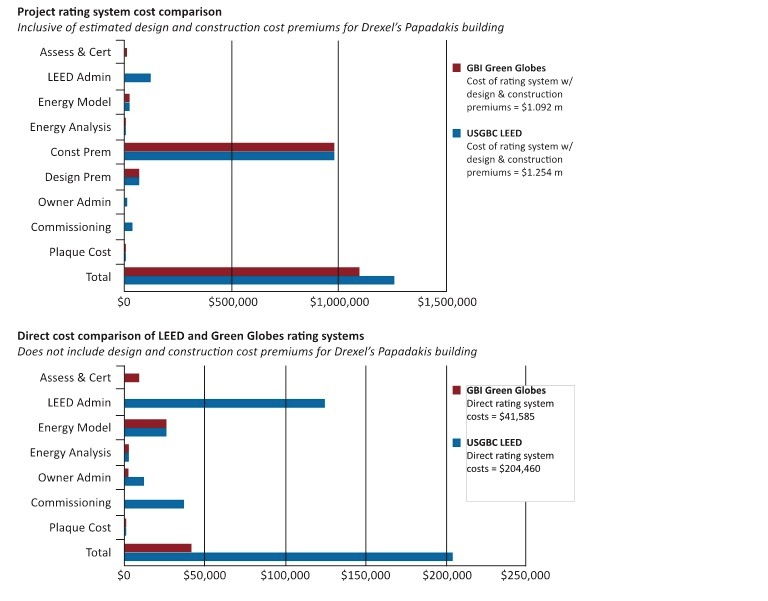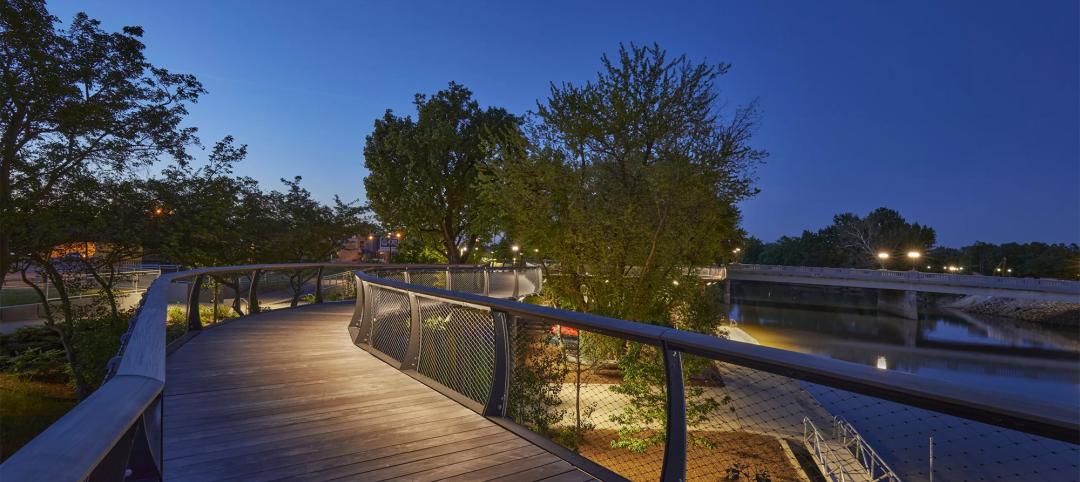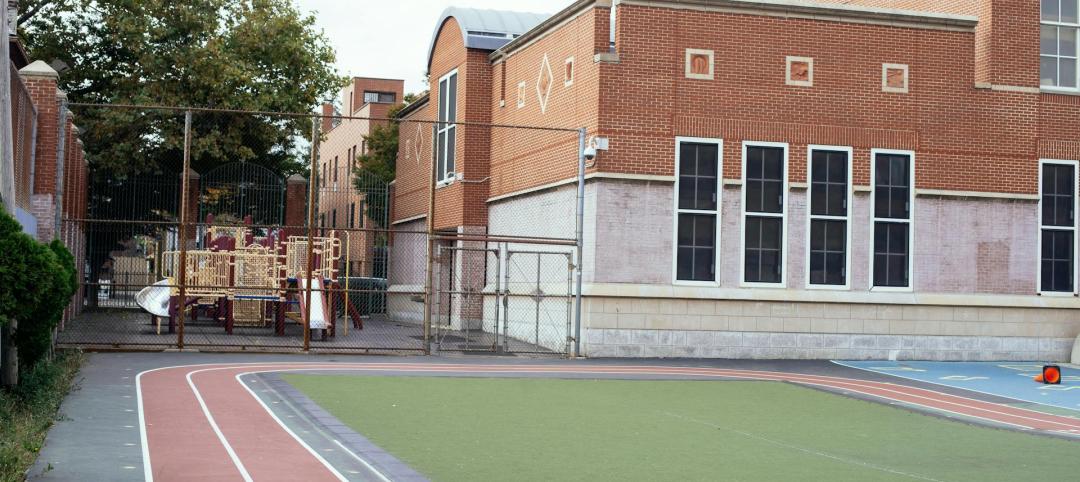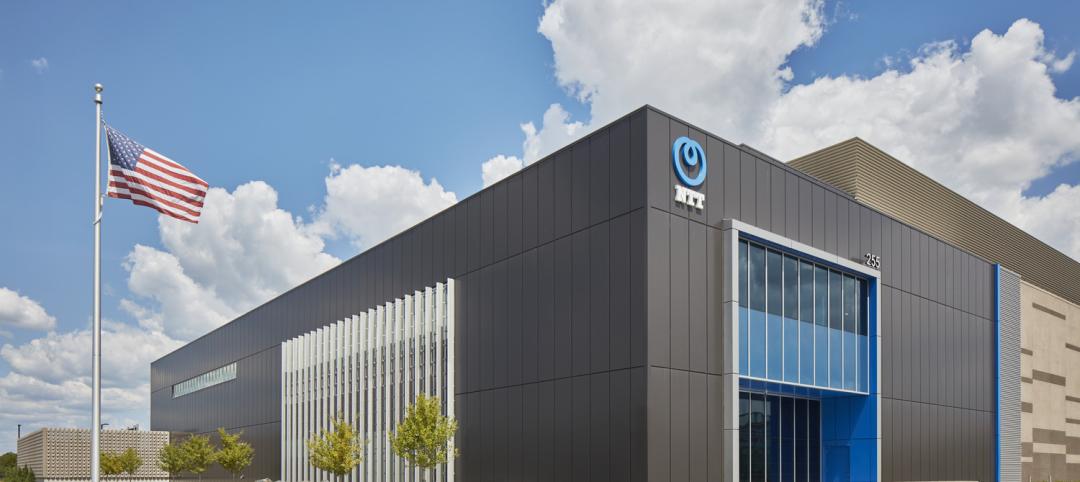The Green Building Initiative (GBI) today announced that, according to a recent study completed by Drexel University professor Jeffrey Beard, GBI’s Green Globes certification process is significantly less expensive to conduct and faster to complete than LEED certification, according to GBI president Jerry Yudelson.
“Green Globe certification currently gives the market a choice among certification systems and provides competition that helps improve results for users, resulting in more innovation and lower costs over time,” Yudelson said. “In this particular project, the cost savings to the University were on the order of $1.00 per square foot, a significant number for a large building.”
The final report, prepared by Beard, an associate professor in the ?Department of Construction Management at Drexel’s College of Engineering, is titled “A Study of Comparative Sustainability Certification Costs/Green Rating System Cost Comparison Study: LEED and Green Globes.” Beard’s research examined:
- Intrinsic hard costs – allocable on a line-by-line basis – for meeting criteria in each of the rating systems;
- Soft costs, whether accounted for as part of the indirect project costs or secondary soft costs that arose as a result of the project, but were otherwise allocated or absorbed; and
- Optional costs arising from implementation of the two green building rating systems.
The research was confined to the Papadakis Integrated Sciences Building at Drexel’s West Philadelphia campus, a five-story, 130,000-square-foot laboratory and classroom building that opened in 2011.
A key variance in the two rating systems that was revealed by the study was the cost of using each for the Papadakis building. The breakdown summarized in the university’s records indicates internal (staff time) costs at Drexel for administering both systems were more than $125,000 for LEED versus $9,000 for Green Globes. The report’s summary shows aggregate green building costs (i.e., hard cost premium, soft costs and optional costs for sustainability rating) nearly 15 percent higher for LEED than for Green Globes. The table below illustrates cost differences between LEED and Green Globes in several key areas of design, management and assessment.
Funding for the study came from the Green Building Initiative. However, Professor Beard conducted the research without any oversight from GBI, using timesheets and other records of administrative costs maintained by the project team and Drexel University.
The Papadakis Building received three Green Globes from GBI and a LEED Gold rating from the US Green Building Council. The architects were Toronto, Canada-based Diamond Schmitt Architects and H2L2 of Philadelphia. Turner Construction Company provided construction services.
About the Green Building Initiative™ - The GBI is a nonprofit organization and American National Standards Institute (ANSI) Standards Developer dedicated to accelerating the adoption of green building practices. Founded in 2004, the organization is the sole U.S. provider of the Green Globes® and federal Guiding Principles Compliance building certification programs. To learn more about opportunities to become involved in the GBI, contact Jerry Yudelson, President,(jerry@thegbi.org), visit the GBI website,www.thegbi.org, or send an email to GBI's Marketing Director Shaina Sullivan (shaina@thegbi.org)
Related Stories
Lighting | Mar 4, 2024
Illuminating your path to energy efficiency
Design Collaborative's Kelsey Rowe, PE, CLD, shares some tools, resources, and next steps to guide you through the process of lighting design.
MFPRO+ News | Mar 1, 2024
Housing affordability, speed of construction are top of mind for multifamily architecture and construction firms
The 2023 Multifamily Giants get creative to solve the affordability crisis, while helping their developer clients build faster and more economically.
Multifamily Housing | Feb 29, 2024
Manny Gonzalez, FAIA, inducted into Best in American Living Awards Hall of Fame
Manny Gonzalez, FAIA, has been inducted into the BALA Hall of Fame.
K-12 Schools | Feb 29, 2024
Average age of U.S. school buildings is just under 50 years
The average age of a main instructional school building in the United States is 49 years, according to a survey by the National Center for Education Statistics (NCES). About 38% of schools were built before 1970. Roughly half of the schools surveyed have undergone a major building renovation or addition.
MFPRO+ Research | Feb 28, 2024
New download: BD+C's 2023 Multifamily Amenities report
New research from Building Design+Construction and Multifamily Pro+ highlights the 127 top amenities that developers, property owners, architects, contractors, and builders are providing in today’s apartment, condominium, student housing, and senior living communities.
AEC Tech | Feb 28, 2024
How to harness LIDAR and BIM technology for precise building data, equipment needs
By following the Scan to Point Cloud + Point Cloud to BIM process, organizations can leverage the power of LIDAR and BIM technology at the same time. This optimizes the documentation of existing building conditions, functions, and equipment needs as a current condition and as a starting point for future physical plant expansion projects.
Data Centers | Feb 28, 2024
What’s next for data center design in 2024
Nuclear power, direct-to-chip liquid cooling, and data centers as learning destinations are among the emerging design trends in the data center sector, according to Scott Hays, Sector Leader, Sustainable Design, with HED.
Windows and Doors | Feb 28, 2024
DOE launches $2 million prize to advance cost-effective, energy-efficient commercial windows
The U.S. Department of Energy launched the American-Made Building Envelope Innovation Prize—Secondary Glazing Systems. The program will offer up to $2 million to encourage production of high-performance, cost-effective commercial windows.
AEC Innovators | Feb 28, 2024
How Suffolk Construction identifies ConTech and PropTech startups for investment, adoption
Contractor giant Suffolk Construction has invested in 27 ConTech and PropTech companies since 2019 through its Suffolk Technologies venture capital firm. Parker Mundt, Suffolk Technologies’ Vice President–Platforms, recently spoke with Building Design+Construction about his company’s investment strategy.
Performing Arts Centers | Feb 27, 2024
Frank Gehry-designed expansion of the Colburn School performing arts center set to break ground
In April, the Colburn School, an institute for music and dance education and performance, will break ground on a 100,000-sf expansion designed by architect Frank Gehry. Located in downtown Los Angeles, the performing arts center will join the neighboring Walt Disney Concert Hall and The Grand by Gehry, forming the largest concentration of Gehry-designed buildings in the world.
















